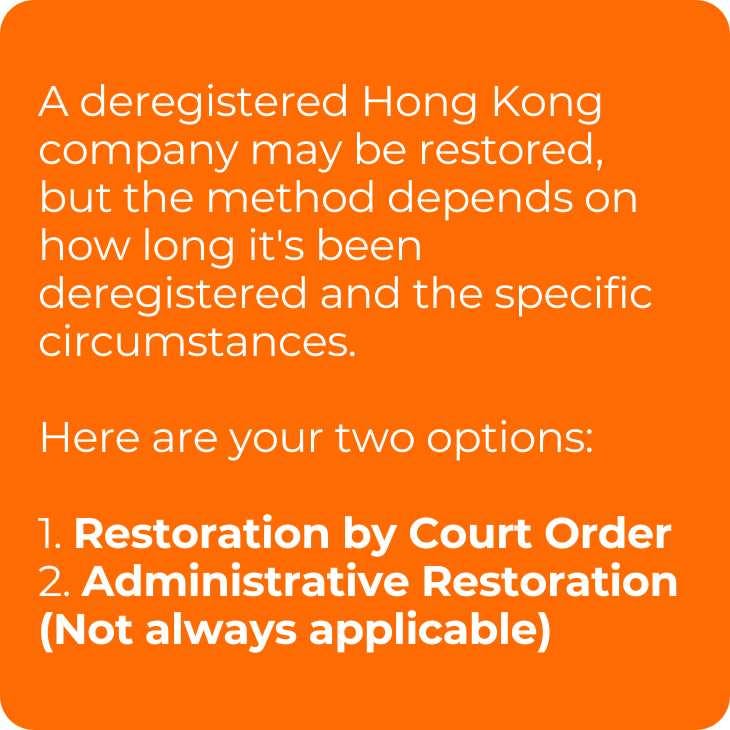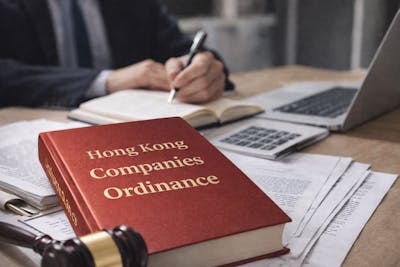Only private companies or companies limited by guarantee that are defunct and solvent can apply for deregistration.
Common reasons include shareholder disputes, lack of profitability, statutory non-compliance, or corporate restructuring.
The process typically takes around six months and involves obtaining a "Notice of No Objection" from the Inland Revenue Department (IRD).
Once deregistered, the company is dissolved, and any remaining assets become bona vacantia and are vested in the Hong Kong Government.
Sometimes things don’t work out. If you want to stop your business, deregistering your Hong Kong company is often the easiest and most cost-effective option.
This guide explains everything you need to know about Hong Kong company deregistration, including eligibility, conditions, and the full process.
What Is Company Deregistration?
In simple terms, deregistration is the fact to put an end to the existence of a company.
The company is removed from the official register of companies maintained by the Hong Kong Companies Registry.
Once a Hong Kong company is deregistered, it stands dissolved and ceases to carry on business operations.
If you're just starting and looking to register your company in Hong Kong, check out our step-by-step guide to help you through the process.
What Hong Kong Companies Are Eligible for Deregistration?
According to the Hong Kong Companies Ordinance, only private companies or companies limited by guarantee that are defunct and solvent can be deregistered or apply for deregistration.
Some types of companies are not allowed to use this method, as explained in section 749(2) of the law.
A company is defunct if it is no longer functioning.
On the other hand, a company is solvent if it has no outstanding liabilities or if its assets are greater than its liabilities.
What Are the Reasons for Deregistering a Hong Kong Company?
There are various circumstances that may lead a company to be deregistered. These include:
- Inability to make a profit
- Disputes between the company's shareholders
- The decision to stop the business
- Corporate restructuring (mergers, acquisitions, or corporate takeovers may require the deregistration)
- Failure to meet statutory compliance requirements (filing annual returns or maintaining a registered office address in Hong Kong)
- Inability to satisfy company's debts or other liabilities
What Conditions Must Be Met Before a Hong Kong Company Can Apply for Deregistration?
To close down a company through deregistration, it must be a private company or a company limited by guarantee that was set up under the Companies Ordinance (Cap. 622). The company must also meet these conditions:
- Its members must agree to the deregistration
- Must not have commenced or carried on business for at least the past three months
- Have no outstanding liabilities
- Not a party to any legal proceedings
- The company's assets do not consist of any immovable property located in Hong Kong
- If the company is a holding company, none of its subsidiaries' assets consist of any immovable property located in Hong Kong
- Obtain a "Notice of No Objection" from the Commissioner of Inland Revenue (either the company or a chosen person can ask for this letter)
All debts (e.g., taxes, wages, supplier payments) must be settled. Companies must also sell or transfer any immovable property before applying. Legal disputes, if there are any, must be fully resolved. A responsible person, either a shareholder or director, must be appointed to manage the deregistration process.
What Is the Process for a Hong Kong Company's Deregistration?

Hong Kong company's deregistration may be divided into two broad stages.
The first stage is obtaining a written Notice of No Objection from the Commissioner of Inland Revenue.
Meanwhile, the second is the actual application for deregistration to the Companies Registry.
Step 1: Obtaining a Written Notice of No Objection from the IRD
The written notice of no objection is a document that confirms that the company to be deregistered has no outstanding tax liability or obligations.
To obtain this notice, the company (or its representative) must submit a written application to the IRD, typically using Form IR1263, along with supporting documents.
While audited financial statements are not strictly mandatory in all cases, the IRD may request them or other relevant financial records to assess whether the company has fulfilled all tax obligations.
If the IRD is satisfied that the company has no tax liabilities, it will issue the notice of no objection, which is a mandatory document for submitting a deregistration application to the Companies Registry.
Step 2: Actual Deregistration With the HK Companies Registry
Once the notice of no objection is obtained, the company or a director/member can apply to the Companies Registry for deregistration.
The application is to be in the NDR1 form and accompanied by the notice of no objection and any other document or information the Registrar may require.
If the application is made by the company and not a director/member, it must nominate a natural person to receive the notice of deregistration.
Within five working days of the receipt of the application and upon confirmation that the application is in order, an approval letter for the company's deregistration will be issued to the company.
After that, the Registrar will publish a notice of the proposed deregistration in the Hong Kong Gazette requesting objections to the company's deregistration.
If no objection is received within the specified time, the Registrar will publish a final notice declaring that the company has been deregistered and a notice of deregistration is to be given to the person who applied for the deregistration of the company or the person appointed to receive such notice.
How Long Does It Take for a Hong Kong Company to be Deregistered?
The deregistration process can be completed within six months, including the time spent obtaining the notice of no objection from the Inland Revenue.
What Is the Effect of Deregistration?
Upon the publication of the notice of deregistration in the Gazette by the Registrar, the deregistered company is dissolved and ceases to exist.
Any right or asset of the company is deemed bona vacantia and will be vested in the Hong Kong Government's Special Administrative Region. There are some important things to know.
Company is Removed from Public Records
Once a company is deregistered, it will be taken off the Companies Registry’s public list. This means if someone searches for the company, it won’t show up anymore almost like it never existed as a business.
After the deregistration:
- The company is dissolved and removed from public records.
- It ceases to exist legally and cannot operate or enter into contracts.
- Any remaining property becomes bona vacantia and is vested in the Hong Kong Government.
- No further annual filings or fees are required, though statutory records must be retained for six years.
Are There Any Obligations to Be Met During or After the Deregistration Process?
Before the deregistration process is completed, the company to be deregistered must continue to satisfy the statutory compliance requirements under the Companies Ordinance.
The company must continue to file annual returns, maintain a registered office, notify the Companies Registry of changes in directors or company secretary, etc.
Failure to do these will attract some penalties.
After the deregistration process is completed, the liability of the deregistered company's directors, managers, and members survives and can still be enforced.

Can a Deregistered Hong Kong Company Be Restored?
A deregistered Hong Kong company can be restored.
However, this can only be done by the Registrar where the company was deregistered (a) as a result of the mistake of the Registrar or (b) upon the order of a court.
In the case of restoration by order of the court, such an order can only be made if an application for restoration is brought by a relevant person within twenty years of the publication of the notice of deregistration.
Such an application can be granted by the court if it appears just for the court to do so.
The restoration process may take up to two months to be completed.
Upon restoration, the company is treated as if it had never been dissolved.
What Are The Other Options Besides Deregistering a Hong Kong Company
Before you decide to officially close your Hong Kong company, you might want to think about some other options:
Making the Company Dormant
One choice is to make the company "dormant." This means it stays registered but stops doing business.
You still have to send in yearly forms and pay some fees, but you can avoid the cost of a full financial check.
This option is ideal if you’re unsure about shutting down completely, since you can start the business again later without creating a new company.
Liquidation
If your company doesn’t meet the rules for deregistration, liquidation might be a better choice. This is a more serious process where the company is fully closed, all debts are paid, and anything left is given to the owners.
Liquidation takes more time and money but gives a complete and official end, especially if the company has complicated issues.
Selling the Company
You could also sell the company instead of closing it: this is sometimes called selling a "shell company."
The new owner keeps the company’s legal setup, which saves them time and money compared to starting a brand-new company.
Is Deregistration Different from Striking Off?
Company deregistration Hong Kong is not the only method for bringing a company's operations to an end.
Striking off is another method for dissolving a company provided in the Companies Ordinance but it differs from deregistration. It is a statutory power usually exercised by the Registrar when the Registrar is satisfied that a Hong Kong company is no longer in operation or carrying on a business.
The Registrar can remove the name of the company from the register of companies, and the company stands dissolved once its name has been struck off the register. Deregistration, on the other hand, is fully voluntary as it is exercised by the members of the company. It is not imposed by statute.
Need help with business registration? Register with Air Corporate today and get a free business kit!






